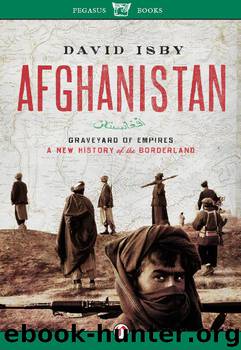Afghanistan by David Isby

Author:David Isby [Isby, David]
Language: eng
Format: epub
Tags: (¯`'•.¸//(*_*)\\¸.•'´¯)
ISBN: 9781453217979
Publisher: Pegasus Books
Published: 2011-05-26T14:00:00+00:00
Land and Water
Conflicts over land and water rights underlie a lot of Afghanistan’s internal strife, including those relating to corruption and even terrorism. Arable land and water are both scarce in what is generally an infertile country, and this scarcity adds to their value as a source of income and status in an overwhelmingly agrarian society. This is perhaps the main area where the inability of the Kabul government to put an effective civil system in place has the most direct impact on rural Afghanistan and thus their hold on power throughout the provinces. In the absence of a state system to allocate water resources and adjudicate land titles, a mixture of traditional law and force has tended to resolve disputes, delegitimizing Kabul even further and giving insurgents and warlords a hold on power that they would not otherwise have.
Traditional law approaches tend to stress the use of shuras or jirgas. The hoqooq, a local traditional dispute-resolution body, made up of experts on land tenure and ownership, is still used in some districts. Mediation by sayids is also used. In some areas, the state judicial system has been able to supplant these traditional mechanisms. In insurgent-controlled areas, these have been replaced by rough justice under a veneer of Sharia law, and those who take in traditional dispute resolution are frequently murdered. Much of what is called warlord oppression is their ability to resolve disputes over water and property in favor of themselves or those close to them. Many of these conflicts turn violent, a fact often lost in the larger concern about the insurgency, narcotics, and crime. It is estimated that several hundred Afghans a year are killed in land and water—related disputes.339 A non-corrupt local government or court system was absent in the sites of many of these disputes.
Allegiances and orientations are frequently determined, at a local level, by Kabul’s willingness to favor one mode of agriculture over another. In the 1970s and 1980s, the conflict between Pushtu-speaking Kuchi nomadic herdsmen and Uzbek or Hazara sedentary pastoralists was based on competition between different agricultural practices; Pushtun-dominated governmental authority looked away as cattle were driven over standing crops. Dostum’s original Uzbek militia, formed in the 1980s, was intended to halt this practice. In the 1980s, some of Soviet-occupied Kabul’s strongest rural allies were not committed Communists but those who depended on the central government to allow them to hold on to irrigated land against the claims of their neighbors, especially in areas such as those around Khost and in Kandahar province’s Maiwand district. It is not surprising that in 2001 the Taliban’s strongest supporter in the south, Mullah Abdul Wahid in the Baghran district of Helmand province, was an “upstream” leader, who had been able to keep scarce water for local use due to his personal relations with the Taliban. Since then, he has skillfully kept on good relations with both Kabul and the insurgents, which has enabled him to remain politically important in Helmand through his ability to affect the water supply.
Download
This site does not store any files on its server. We only index and link to content provided by other sites. Please contact the content providers to delete copyright contents if any and email us, we'll remove relevant links or contents immediately.
Learning SQL by Alan Beaulieu(6291)
Weapons of Math Destruction by Cathy O'Neil(6280)
Digital Minimalism by Cal Newport;(5764)
iGen by Jean M. Twenge(5416)
Sapiens by Yuval Noah Harari(5370)
The Age of Surveillance Capitalism by Shoshana Zuboff(4292)
Elon Musk by Ashlee Vance(4127)
Thing Explainer by Randall Munroe(3940)
Apollo 8 by Jeffrey Kluger(3709)
Future Crimes by Marc Goodman(3600)
The Science Book (Big Ideas Simply Explained) by DK(3287)
The Innovators: How a Group of Hackers, Geniuses, and Geeks Created the Digital Revolution by Walter Isaacson(3209)
Who Can You Trust? by Rachel Botsman(3133)
I Live in the Future & Here's How It Works by Nick Bilton(2997)
Infinite Energy Technologies by Finley Eversole(2984)
Steve Jobs by Walter Isaacson(2899)
Dawn of the New Everything by Jaron Lanier(2772)
Chernobyl by Serhii Plokhy(2538)
Ben Franklin's Almanac by Candace Fleming(2531)
